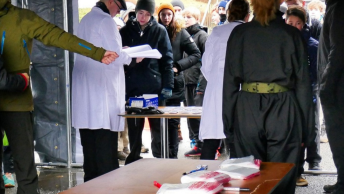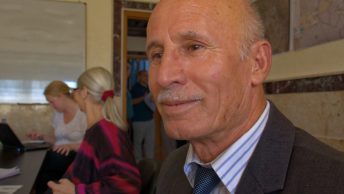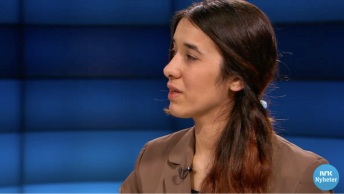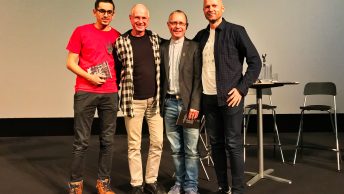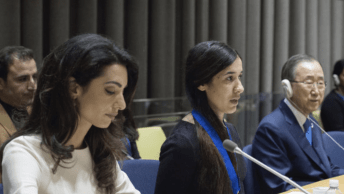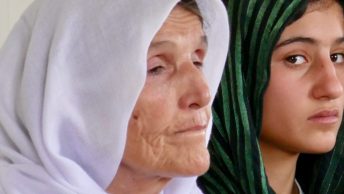SHIKHAN (Kurdistan Region of Iraq): The spiritual leader of the Yezidi people said the minority he leads needs international help to recover from the worst atrocities they have suffered in their 74th genocide. Help is also needed to reintegrate thousands of women enslaved by the Islamic State.
Khurto Hajji Ismail, the Yezidi religious leader who goes by the name Baba Sheikh, said he had issued an announcement to reintegrate former female prisoners. It has helped to overcome traditional resistance to accepting back women who have been raped or members who converted to another faith, even if under duress.
Hundreds of women freed from captivity, either by escape or in return for ransom, have been rebaptized as Yezidis by the stream that runs beneath their temple in Lalesh. A ceremony that symbolizes belonging to society.
“Baptism means you are welcome,” Baba Sheikh said in an interview at his residence in Shikhan, which is located in the Kurdish region of northern Iraq.
The Islamic State enslaved thousands of Yezidi girls, women and boys when they conquered parts of Iraq in 2014. Thousands of men were then killed in what a UN commission has characterized as a genocide of the Yezidis. A religious indigenous people of over 600,000 people in Iraq who mostly live in the Sinjar Mountains in northwestern Iraq. Close to the Syrian border. They speak Kurmanji, a Kurdish language.
Yazidism, which combines elements of ancient Middle Eastern religions, is considered infidel by the fundamentalist Sunni Islamists who have declared a caliphate over parts of Syria and Iraq.
The militant Islamists are now under attack from militia groups, major powers and the army in one of their strongholds, Mosul. Prisoners from the Yezidis are held there, while many have been taken to Raqqa in Syria, which is another stronghold for ISIL.
“We have spoken to the French, the Germans, the Americans and we went to Moscow,” said Baba Sheikh, who added that it is up to the international community to find the “best way” to protect the Yazidis after the Islamic State is defeated .
As noted, Baba Sheikh published an announcement in February 2015 saying that those rescued “remain pure Yazidis,” and asked that “everyone must work together to ensure that the victims can return to their normal lives and reintegrate into society.”
Men mer enn 3500 er fortsatt i fangenskap, sier Hussein Alqaidi, som er direktør den kurdiske selvstyre-administrasjonen sin avdeling for kidnappede personer.
A “network of good people” active in Islamic State is helping to secure the release of some of those freed, he told Reuters earlier. He did not want to give more details about how they operated, but some freedmen have said ransoms have been paid for their freedom.
The financial aspect is very important, but there are also some operations where we have told prisoners to go to a specific location, then we have been able to release them without ransom, said Alqaidi.
Almost 2,800 have been released, including 1,030 women, 1,450 children and 300 men, Alqaidi further said.
One former slave, Warida Haji Hameed, said she was freed along with four of her children after $35,000, or $7,000 per person, was paid to her owner.
he 27-year-old woman is one of those who were taken to the temple in Lalesh to be baptized again after she was forced to convert to Islam. She has been released for a year now and lives in a refugee camp for internally displaced persons near the Kurdish town of Duhok.
“We were so happy about the baptism,” she said. “We prayed for all those who are still missing and for my husband,” who was kidnapped at the same time as the rest of the family.
But Heloua Hussein, another former slave, said she cannot afford the trip to Lalesh. “We have nothing, no oil for heat and no food,” said the 44-year-old woman. She lives on a construction site in Duhok with two other Yezidi families.
“Society has generally welcomed former slaves with love and consideration, and many have married Yazidis who have fled to Europe,” said Saib Khidir, a lawyer and human rights activist who is also Yazidi and lives in Baghdad.
“However, the level of violence inflicted on them is so severe that they need very special care and treatment that local authorities unfortunately cannot provide.”
The Islamic State took most of the areas of the Yazidis in the Sinjar district in northwestern Iraq on August 3, 2014. This first caused tens of thousands to flee to the Sinjar mountain. There they were trapped and suffered from a significant lack of water and food. As well as murder and kidnapping as well as rape and captivity of thousands of girls and women in particular.
Those who remained were subjected to acts of brutal genocide. Thousands were killed. Hundreds were buried alive. Countless acts of rape, kidnapping and slavery were also carried out there, especially against the girls and women. The men were beheaded and the Yezidis’ simple but holy places were ransacked and destroyed.
A Yazidi member of the Iraqi parliament, Vian Dakhil, said last August that 3,770 Yazidi women and children were still being held captive by the Islamic State.
Source: http://ekurd.net/yazidi-protection-after-genocide-2016-12-08 – September 2016


